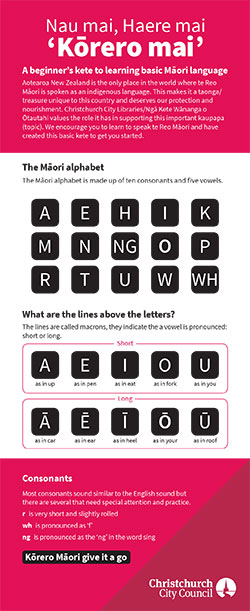Download and print our foldable wallet card resource that was created to help beginners learn some basic te reo Māori words and greetings (includes a pronunciation guide).
Nau mai, Haere mai, ‘Kōrero mai’
A beginner's kete to learning basic Māori language.
Aotearoa New Zealand is the only place in the world where Te Reo Māori is spoken as an indigenous language. This makes it a taonga/treasure unique to this country which deserves our protection and nourishment.
Christchurch City Libraries / Ngā Kete Wānanga o Ōtautahi values the role it has in supporting this important kaupapa (topic). We encourage you to learn to speak te reo Māori and have created this basic kete to get you started.
Greetings
- Kia ora
- Hello / Thank you
- Tēnā koe
- Formal greeting to one person
- Tēnā kōrua
- Formal greeting to two people
- Tēnā koutou
- Formal greeting to many people
- E noho rā
- Goodbye (from a person leaving)
- Haere rā
- Goodbye (from a person staying)
- Hei kōnei rā
- Goodbye (less formal)
- Ka kite anō
- See you again (informal goodbye)
- Mōrena
- Good morning
- Ata mārie
- Good morning
- Pō mārie
- Good night
- Haere mai
- Welcome, enter
- Nau mai
- Welcome
- Ngā mihi nui
- With best wishes
Other useful kupu (words)
- Āe
- Yes
- Kāo
- No
- Aua
- I don’t know
- Whānau
- Extended family
- Hapū
- Group of whānau descended from the same ancestor
- Iwi
- Tribe, nation
- Kaumātua
- Male or female elder/s
- Whakapapa
- Genealogy
- Rā
- Day / sun
- Pō
- Night / darkness
- E noho
- Sit down
- E tū
- Stand up
- E moe
- Go to sleep
- E kai
- Eat up
- Whakarongo
- Listen
- Tītiro
- Look
- Turituri
- Be quiet
- Kāti
- Stop
- Taihoa
- Wait up
- Kia tūpato
- Be careful
- Kia kaha
- Be strong
Correct pronunciation indicates a bicultural awareness and respect for Māori culture. Go to our bilingual signs pages to listen to some pronunciation examples.
What does the Māori alphabet look like?
The Māori alphabet is made up of ten consonants and five vowels:
A E H I K
M N NG O P
R T U W WH
What do the lines above the vowels mean?
The lines are called macrons; they indicate the way a vowel is pronounced: short or long.
Short sound: A/a (as in up); E/e (as in pen); I/i (as in eat); O/o (as in fork); U/u (as in you)
Long sound: Ā/ā (as in far); Ē/ē (as in peel); Ī/ī (as in heel); Ō/ō (as in your); Ū/ū (as in roof)
Consonants
Most sound similar to the English sound but there are several that need special attention and practice e.g.
r is very short and slightly rolled
wh is pronounced as f
ng is pronounced as the ng in singer


